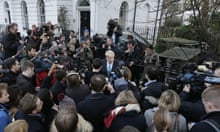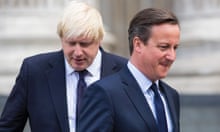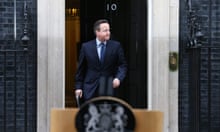David Cameron has called for his referendum on Britain’s membership of the EU to take place on 23 June, after the cabinet formally agreed to campaign to stay in despite several ministers openly supporting Brexit.
Speaking from outside Downing Street, the prime minister said he had secured a good deal with Brussels to give the UK a special status and leaving the EU would “threaten our economic and national security”.
The majority of the cabinet agreed to back the deal agreed in Brussels by Cameron with 27 other EU leaders reforming Britain’s relationship with the rest of the bloc. But within minutes of his announcement, some ministers began to declare they will fight for the UK to leave the EU.
Six cabinet ministers – Michael Gove, Iain Duncan Smith, Chris Grayling, Theresa Villiers, John Whittingdale, and Priti Patel – gathered for a photograph at the headquarters of Vote Leave, signalling their intention to back the main Brexit campaign.
Cameron confirmed they would all be able to campaign freely and said there would be many passionate arguments over the months ahead, but the ultimate decision would lie with the British people.
In an address to the nation, he said: “We are approaching one of the biggest decisions this country will face in our lifetimes: whether to remain in a reformed EU or to leave. The choice goes to the heart of the kind of country we want to be and the future we want for our children,” he said.
“I do not love Brussels. I love Britain. I am the first to say there are many ways the EU needs to improve. The task of reforming Europe does not end with yesterday’s agreement. I will never say our country could not survive outside Europe … That is not the question. The question is will we be safer, stronger and better off working together in a reformed Europe or out on our own.
“You will decide and whatever your decision I will do my best to deliver it,” he added.
The prime minister will now go to parliament on Monday to begin the process of calling the referendum, leaving about four months for campaigning.
Cameron has most of the prominent cabinet ministers on his side, including Theresa May, the home secretary, Philip Hammond, the foreign secretary, and George Osborne, the chancellor.
However, Boris Johnson, the London mayor, is still undecided and could be a huge coup for the leave campaign if he decides to back Brexit, given his popularity with voters.
So far, Gove is the biggest Tory name to declare for leaving the EU. In the other parties, prominent Brexit supporters include Ukip leader Nigel Farage, as well as Labour’s Kate Hoey and Frank Field.
In a statement, Gove said it was the most difficult decision of his political life but his experience as a government minister had deepened his “conviction that we need change”.
“I will be true to my principles and take the opportunity this referendum provides to leave an EU mired in the past and embrace a better future,” he said.
Cameron has already expressed regret that Gove, one of his closest allies, will be campaigning on the opposite side.
“Michael is one of my oldest and closest friends but he has wanted to get Britain to pull out of the EU for about 30 years,” he said. “So of course I am disappointed that we are not going to be on the same side as we have this vital argument about our country’s future. I am disappointed but I am not surprised.”
As the date was announced, Alan Johnson, former home secretary and chair of Labour In For Britain, said the proper campaign could begin.
“The deals are done, the theatrics are over. The prime minister has fired the starting gun in a campaign where Labour will be campaigning for a Britain that remains in Europe on 23 June,” he said.
“In this campaign our party will be united in making the case that Britain is better off in Europe.”
Earlier, the Labour leader, Jeremy Corbyn said Cameron’s deal in Brussels was a sideshow and largely irrelevant.
“His priorities in these negotiations have been to appease his opponents in the Conservative party,” Corbyn said.
“He has done nothing to promote secure jobs, protect our steel industry, or stop the spread of low pay and the undercutting of wages in Britain. Labour’s priorities for reform in the EU would be different, and David Cameron’s deal is a missed opportunity to make the real changes we need.
“We will be campaigning to keep Britain in Europe in the coming
referendum, regardless of David Cameron’s tinkering, because it brings investment, jobs and protection for British workers and consumers.”
The agreement in Brussels was done after a marathon round of talks over two days, concluding shortly after 9pm on Friday.
After the summit, the prime minister insisted he had strengthened his key demands since the European council president, Donald Tusk, outlined his draft agreement on 2 February. The key changes will mean that:
- A proposed “emergency brake” on EU migrants claiming in-work benefits will last for seven years. It will cover individuals for no more than four years, but the UK will be allowed to apply the overall restrictions for seven years.
- Restrictions on child benefit for EU migrants will kick in at a reduced rate – indexed to the rate of a migrant’s home country – for new migrants with immediate effect. Existing EU migrants will be paid at the lower rate from 2020. Eastern European countries had hoped that existing migrants would be exempt.
- Britain has a specific opt-out from the EU’s historic commitment to forge an “ever closer union among the peoples of Europe”.
- One country – in effect Britain – will have the right to impose a handbrake to refer contentious financial regulation to a meeting of EU leaders in the European council.
The prime minister said: “When we set off down this track and I said we would renegotiate our membership from a standing start, people said you will never hold that renegotiation, you’ll never hold that referendum, you will never get people to agree to the things we want. But look at what we have agreed today.”
But the prime minister will now be thrown into the most perilous phase of his premiership even though he claims he has strengthened the draft deal for Britain, which was seen as underwhelming – even by some pro-Europeans.
A victory for the leave side in the referendum would be a huge defeat for the government, potentially terminating Cameron’s premiership and killing off Osborne’s hopes of succeeding Cameron as leader of the Tory party.
The prime minister would be told by the 1922 committee of Tory backbenchers that he could not lead the two years of negotiations over Britain’s exit from the EU after having led a failed campaign to keep the UK in a reformed EU.










Comments (…)
Sign in or create your Guardian account to join the discussion